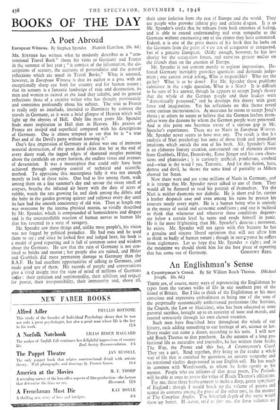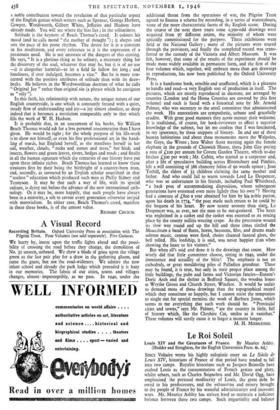An Englishman's Sense
A Countryman's Creed. By Sir William Beach Thomas. (Michael Joseph. 10s. 6d.) THERE are, of course, many ways of representing the Englishman by types from the various walks of life in our southern part of the island of Britain. But I like to think of the Englishman at his most conscious and expressive embodiment as being one cf the sons of the perpetually economically embarrassed professions (the Services, the Church, the Law or Medicine), who has been educated at some parental sacrifice, brought up to an austerity of taste and morals, and reacted sensuously through his own chosen vocation.
Such men have flourished here throughout the whole of our history, each adding something to our heritage of art, science or law. Every reader can name a dozen, according to his taste. I will now add Beach Thomas to that pantheon. In the autumn of a long pro- fessional life as naturalist and journalist, he has written three books, The Way, the Poems and this last, A Countryman's Creed. They are a unit. Read together, they bring to the reader a whole way of life that is enriched by quietness. an austere sympathy and an emotional vitality deep-rooted in our English soil. He has much in common with Wordsworth, to whom he looks openly as his mentor. People who are initiates of that great poem, The Prelude, will be able at once to assess the value of Beach Thomas's affiliations.
For me, these three books concert to make a deep, green symphony of England ; though I would break 111) the volume of poems and scatter its contents among the prose of the other two, in the manner of The Corn pleat Angler. The historical depth of the verse would show up better. II:,.vever, recd as they arc, the three volumes are a noble contribution toward the revelation of that particular aspect of the English genius which writers such as Spenser, George Herbert, Cowper, Wordsworth, Gilbert White, Jefferies and Hudson have already made. You will see where the bias lies ; in the solitariness.
Solitude is the keynote of Beach Thomas's creed. It colours his mood (and he calls mood " the mother of thought "); it shapes and sets the pace of his prose rhythm. The desire for it is a constant in his meditation, and every reference to it is the expression of a passionate need. He is not unaware of the dangers of this craving. He says, " It is a glorious thing to be solitary, a necessary thing for the discovery of the soul, whatever that may be, but it is of no use —it is altogether harmful—to let a field lie fallow for long ; and loneliness, if over indulged, becomes a vice." But he is more con- cerned with the positive attributes of solitude than with its draw- backs. He believes in the Wordsworthian doctrine of what he calls " Original Joy " rather than original sin (a phrase which he castigates as " silly ").
In this faith, his relationship with nature, the unique nature of our English countryside, is one which is constantly fecund with a quiet, steady flow of understanding and joy—a joy almost absolute, so deep indeed that it becomes a mysticism comparable only to that which fills the work of W. H. Hudson.
It is probable that, in an assessment of his books, Sir William Beach Thomas would ask for a less personal concentration than I have giyen. He would be right ; for the whole purpose of his life-work is to show not himself, or even his fine professsional art in the hand- ling of words, but England herself, as she manifests herself in her soil, weather, clouds, "rocks and stones and trees," her birds and insects, flowers and green leaves, rivers, hedges and roads ; and finally in all the human signature which the centuries of our history have put upon these infinite riches. Beach Thomas has learned to know these treasures first by their being the birthright of a country-born man, and, secondly, as savoured by an English scholar nourished in that " useless " education which produced such men as Philip Sidney and Tennyson. It may be that such a way of life, with its special culture, is dying out before the advance of the new international tech- nology. Or it may be, more happily, that such people have always been in a minority, a salt to savour every generation otherwise insipid with materialism. In either case, Beach Thomas's creed, manifest in these three books, is of the utmost value.
RICHARD CHURCH.



































 Previous page
Previous page